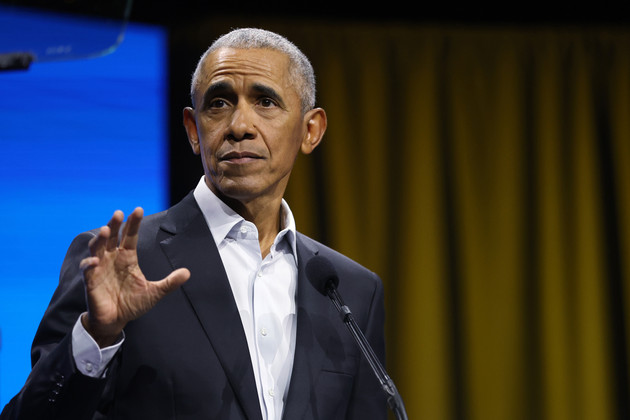Photo Credit: CBS News
Barack Obama’s return to the Democratic National Convention stage in Chicago on August 20, 2024, proved nothing short of vintage Obama—eloquent, emotionally stirring, and politically calculating. However, for those of us on the conservative side of the aisle, it filled the airwaves with the same familiar gaps between rhetoric and reality that defined much of his presidency. Pretty words that lacked practical substance.
President Obama had a key role in anointing both Joe Biden as President and Kamala Harris as Vice-President. Not surprisingly, Mr. Obama naturally wanted to continue his legacy as President-maker by now elevating Kamala Harris to his former throne. Yet Mr. Obama also had a role in dethroning Joe Biden, too, all while commending him publicly as he whisked Biden out the door. Thank you for your service, and enjoy your forced retirement, friend and patriot Biden.
How fitting that Mr. Obama addressed an adoring crowd in Chicago, where he began his political career as a community-organizer, served three terms as state senator, and one term as US Senator before running and becoming the 44th President of the US. During the DNC of 1968, also in Chicago, anti-war protests stole the thunder from Vice-President Hubert H. Humphrey’s bid to replace Lyndon Johnson as President. In 2024, pro-Palestinian protests encircle the Chicago convention center, reminding us of another war in the Middle East. To what degree can Vice President Harris tout her qualifications to take on this major challenge, one which many would argue stands as a failed legacy of Obama-Biden foreign policy?
The Appeal to Unity—A Cover for Partisanship
Obama’s speech, like many before it, suggested we need unity and bipartisanship. He painted a picture of an America that could only thrive when coming together, despite differences. Yet, his eight years in office illustrated deepening divisions, particularly along racial and socioeconomic lines. This contradiction between his message and his record remains glaring. Obama’s promise of unity often serves as a veneer for advancing a liberal agenda that alienates half the country.
His rhetoric about bringing people together belies the hyper-partisanship of today’s Democratic Party—a party that has increasingly pushed for policies that alienate conservatives, from open borders to radical gender ideologies. It’s hard to take calls for unity seriously when his party regularly vilifies conservative values and dismisses the concerns of millions of Americans as backward or bigoted.
Selective History on Economic Progress
Obama touted his administration’s economic achievements, including the recovery from the 2008 financial crisis. However, he glossed over the slowest economic recovery in modern history that took place under his leadership. The economy only truly began to accelerate when pro-business, tax-cutting policies were implemented by the Trump administration, policies that Obama and his party consistently opposed.
Moreover, Obama’s celebration of “Bidenomics” feels like déjà vu. It’s another round of big government spending that has only exacerbated inflation, increased the federal deficit, and hurt middle-class Americans, despite the rosy picture painted from the stage in Chicago. Obama’s nostalgic view of his economic policies ignores the real struggles of working-class Americans who continue to feel left behind by Democratic leadership.
A Continuation of Foreign Policy Failures
On foreign policy, Obama predictably positioned himself as a wise statesman, urging caution in a world fraught with danger. Yet, we cannot forget that his foreign policy decisions, such as the withdrawal from Iraq and the infamous “red line” in Syria, left power vacuums that allowed terrorism to flourish and rogue regimes to grow bolder. The October 7, 2024 Hamas attack on Israel illustrates how Iran and its terrorist proxies have set the Middle East on fire, and that event has its origins in weak Obama-Biden policies toward Iran.
Obama’s diplomatic strategies of “extending an open hand instead of a clenched fist” often centered on appeasement, leading to agreements like the Iran nuclear deal, which many conservatives view as a failure that emboldened Tehran rather than containing it. His calls for multilateralism and diplomacy sound ideal, but they have often come at the expense of American strength and global security. Biden’s lifting of economic sanctions on Iran’s energy sector led directly in $20-30 billion dollars in oil sales to China, which in turn, have helped finance Hamas in Gaza, Hezbollah in Lebanon, and the Houthis in Yemen.,
The Battle Over Democracy—A Partisan Narrative
In his speech, Obama also took aim at threats to democracy, a common theme for Democrats. While no one disputes the importance of safeguarding democratic institutions, Obama’s critique was clearly aimed at conservative movements across the country. His party’s framing of issues like election integrity, gun rights, and states’ rights as threats to democracy is part of a broader effort to delegitimize conservative policies.
Ironically, Democrats often accuse Republicans of undermining democracy, while pushing for measures that centralize power in Washington and erode the rights of states and individuals. Obama’s speech ignored the fact that many Americans see the concentration of power in the federal government as the real threat to democracy.
Conclusion: The Anointing of Yet Another Flawed Vision
Barack Obama’s speech in Chicago intended to inspire and rally his base around Kamala Harris while politely sweeping Joe Biden under the rug . As Yankee catcher Yogi Berra once quipped, “It’s deja vu all over again.” The speech once again reminded us of the chasm between Obama’s lofty words and the reality of his policies. His vision for America—a bigger, more intrusive government and a redefinition of core American values—stands in stark contrast to the principles that many of us hold dear: individual liberty, limited government, and personal responsibility.
Obama may have electrified the Democratic faithful with his return to the spotlight, but his message will do little to bridge the divides that his presidency helped deepen. As conservatives, we must continue to stand firm against the encroaching liberalism that seeks to remake America into something unrecognizable from the vision of the Founding Fathers.




